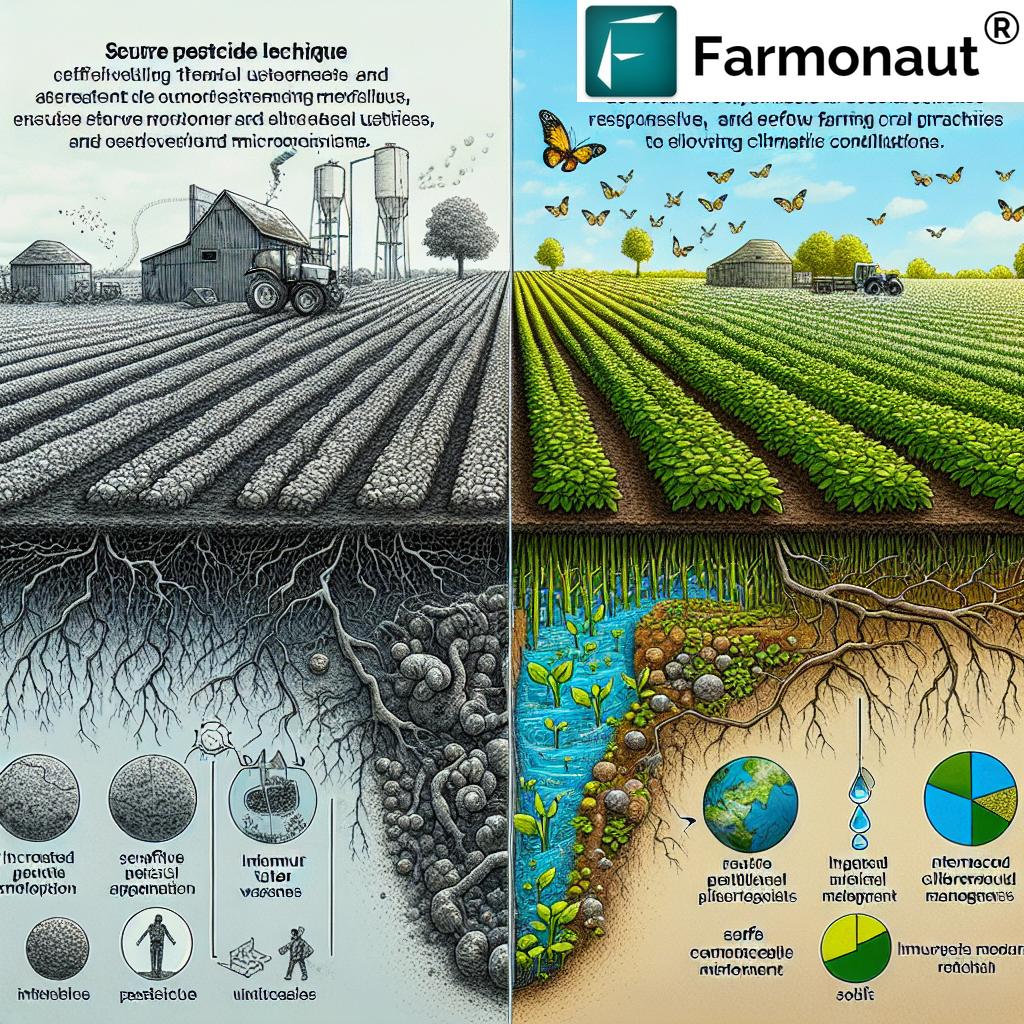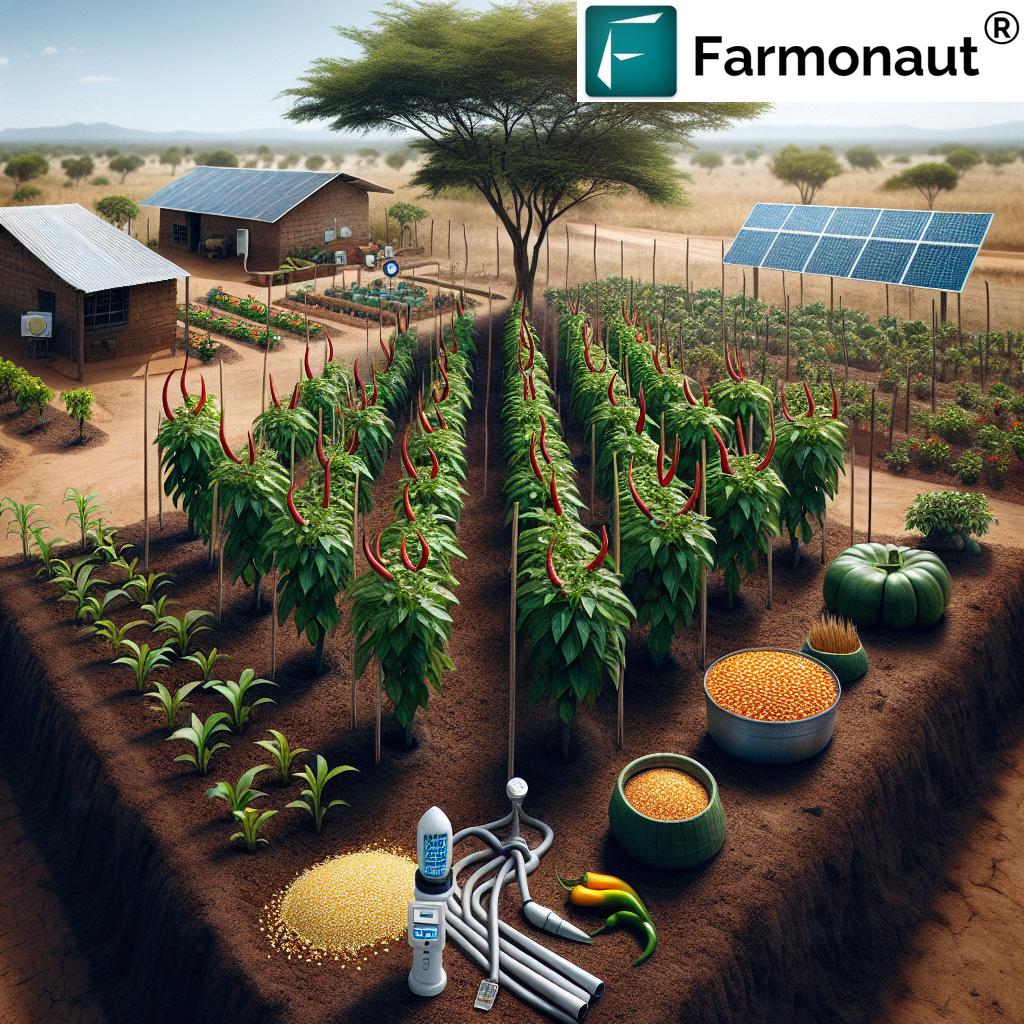Sustainable Farming in Ghana: Balancing Agrochemical Use for Environmental and Economic Prosperity
“Ghana’s agricultural sector employs over 50% of the workforce and contributes approximately 20% to the country’s GDP.”
In the heart of West Africa, Ghana stands as a beacon of agricultural potential. As we delve into the intricacies of sustainable farming practices in this vibrant nation, we uncover a complex tapestry of challenges and opportunities. At Farmonaut, we recognize the critical importance of balancing agrochemical use to achieve both environmental sustainability and economic prosperity in Ghana’s agricultural sector.
Our journey through Ghana’s agricultural landscape reveals a pressing need for responsible agrochemical use, innovative farming techniques, and a commitment to preserving the delicate balance of our ecosystem. Join us as we explore the multifaceted world of sustainable agriculture in Ghana, where tradition meets technology, and where every decision made by farmers can have far-reaching implications for the nation’s future.
The Current State of Agriculture in Ghana
Ghana’s agricultural sector is a cornerstone of the nation’s economy, providing livelihoods for millions and contributing significantly to food security. However, the increasing use of agrochemicals presents both opportunities and challenges for sustainable development.
- Widespread adoption of agrochemicals to boost crop yields
- Growing concerns about the environmental impact of chemical-intensive farming
- Need for balance between productivity and sustainability
As we navigate these complex issues, it’s crucial to understand the role of responsible agrochemical use in shaping the future of Ghana’s agriculture.

The Double-Edged Sword of Agrochemicals
Agrochemicals, including pesticides and fertilizers, have undoubtedly revolutionized farming in Ghana. They have enabled farmers to combat pests, diseases, and soil nutrient deficiencies effectively. However, their use comes with significant risks that cannot be ignored.
Benefits of Agrochemical Use
- Increased crop yields and food production
- Enhanced pest and disease control
- Improved soil fertility through targeted fertilization
Risks Associated with Improper Agrochemical Use
- Soil degradation and loss of biodiversity
- Water pollution and ecosystem disruption
- Health hazards for farmers and consumers
Dr. Hillary Mireku Botey, a Senior Research Scientist from the Council for Scientific and Industrial Research (CSIR)-Crops Research Institute, emphasizes the dual nature of agrochemicals. While they can significantly boost horticultural productivity, misuse can lead to severe health and environmental risks.
Explore Farmonaut’s innovative solutions for sustainable farming:
Health Implications of Improper Agrochemical Application
The Ghana Institute of Horticulturists (GhIH) has raised alarming concerns about the health risks associated with irresponsible agrochemical use. Negligence in application can lead to severe health conditions, including:
- Cancer
- Neurological disorders
- Respiratory infections
These health risks underscore the urgent need for proper training and awareness among farmers and agricultural workers in Ghana.
Environmental Impact of Agrochemical Misuse
“Improper pesticide use can reduce soil microbial biomass by up to 30%, impacting long-term soil health and productivity.”
The environmental consequences of irresponsible agrochemical application extend far beyond immediate health concerns. Chemical leaching into the soil can have devastating effects on ecosystems and disrupt natural processes crucial for soil health.
- Reduction in soil biodiversity
- Death of beneficial microflora
- Alteration of nutrient cycles
- Contamination of water sources
These environmental impacts not only affect current agricultural productivity but also threaten the long-term sustainability of farming in Ghana.
Balancing Act: Economic Growth and Environmental Stewardship
Swiss Ambassador to Ghana, Simone Giger, advocates for a delicate balance between economic growth and environmental stewardship. This approach aligns perfectly with sustainable farming practices that we at Farmonaut champion.
Integrating Environmental, Social, and Governance (ESG) Principles
- Sustainable resource management
- Ethical business practices
- Long-term environmental protection
By embracing these principles, Ghana’s agricultural sector can achieve lasting prosperity while safeguarding its natural resources for future generations.
| Agrochemical Practice | Environmental Impact | Economic Impact |
|---|---|---|
| Controlled Pesticide Application | Reduced soil and water contamination | Improved crop quality and yield |
| Precision Fertilizer Use | Minimized nutrient runoff | Optimized input costs |
| Integrated Pest Management | Enhanced biodiversity | Long-term pest control savings |
| Organic Farming Methods | Improved soil health | Premium pricing for organic produce |
| Crop Rotation | Natural pest and disease control | Diversified income streams |
The Role of Technology in Sustainable Farming
At Farmonaut, we believe that technology plays a crucial role in promoting sustainable agriculture practices. Our satellite-based farm management solutions offer farmers in Ghana the tools they need to make informed decisions about resource management and crop health.
Benefits of Precision Agriculture
- Optimized use of water and agrochemicals
- Real-time crop health monitoring
- Data-driven decision making
By leveraging these technologies, farmers can significantly reduce their environmental footprint while improving productivity and profitability.
Discover how Farmonaut’s API can revolutionize your agricultural operations: Farmonaut API
Education and Awareness: The Cornerstone of Safe Agrochemical Use
Dr. Daniel Attivor, an agronomist, emphasizes the need for comprehensive awareness campaigns focusing on the dangers of irresponsible chemical usage. Education is key to ensuring that farmers understand:
- Proper dosaging of agrochemicals
- Correct application timing
- Importance of using personal protective equipment (PPE)
Unfortunately, many farmers in Ghana lack access to PPE and struggle with understanding product instructions. This knowledge gap must be addressed to promote safe and responsible agrochemical use.
Climate Change and Its Impact on Ghanaian Agriculture
Climate change poses significant challenges to agriculture in Ghana. As temperatures rise and rainfall patterns become increasingly unpredictable, farmers must adapt their practices to ensure food security and maintain productivity.
Climate-Smart Agricultural Techniques
- Drought-resistant crop varieties
- Water conservation methods
- Agroforestry practices
By implementing these climate-smart techniques, Ghanaian farmers can build resilience against the impacts of climate change while reducing their reliance on agrochemicals.

Innovative Agricultural Productivity Techniques
To achieve sustainable farming in Ghana, it’s essential to explore innovative agricultural productivity techniques that reduce the need for excessive agrochemical use. Some promising approaches include:
- Vertical farming
- Hydroponics and aquaponics
- Precision agriculture using IoT devices
- Biofertilizers and biopesticides
These techniques not only increase productivity but also minimize environmental impact, aligning perfectly with Ghana’s sustainable development goals.
Enhance your farming practices with Farmonaut’s mobile apps:
Horticultural Crop Protection Strategies
The horticultural sector in Ghana is particularly vulnerable to pests and diseases. Implementing effective crop protection strategies is crucial for ensuring the quality and quantity of produce while minimizing environmental impact.
Integrated Pest Management (IPM)
- Biological control using natural predators
- Cultural practices to prevent pest infestations
- Targeted use of low-toxicity pesticides when necessary
By adopting IPM strategies, Ghanaian farmers can significantly reduce their reliance on chemical pesticides while maintaining healthy, productive crops.
Soil Health Management: The Foundation of Sustainable Farming
Maintaining soil health is paramount for sustainable agriculture in Ghana. Healthy soils require fewer agrochemical inputs and are more resilient to environmental stresses.
Soil Health Management Practices
- Cover cropping to prevent erosion and improve soil structure
- Composting and organic matter incorporation
- Minimal tillage to preserve soil microorganisms
- Crop rotation to maintain soil fertility
By focusing on soil health, Ghanaian farmers can create a strong foundation for sustainable and productive agriculture.
The Future of Sustainable Farming in Ghana
As we look to the future, the path towards sustainable farming in Ghana is clear but challenging. It requires a concerted effort from all stakeholders – farmers, policymakers, researchers, and technology providers like Farmonaut.
Key Areas of Focus
- Continued research into sustainable farming practices
- Investment in agricultural technology and infrastructure
- Strengthening of agricultural extension services
- Development of supportive policies and regulations
By addressing these areas, Ghana can create a thriving agricultural sector that balances productivity with environmental stewardship.
Conclusion: A Call to Action for Sustainable Agriculture in Ghana
The journey towards sustainable farming in Ghana is one that requires commitment, innovation, and collaboration. By balancing agrochemical use with environmentally friendly practices, we can ensure both economic prosperity and ecological sustainability.
At Farmonaut, we are dedicated to supporting this transition through our advanced agricultural technologies. We invite farmers, policymakers, and all stakeholders in Ghana’s agricultural sector to join us in this crucial endeavor.
Together, we can create a future where Ghana’s farms are not only productive but also serve as stewards of the environment, ensuring food security and economic stability for generations to come.
Frequently Asked Questions (FAQ)
Q: What are the main challenges facing sustainable farming in Ghana?
A: The main challenges include balancing agrochemical use, combating climate change impacts, improving farmer education, and implementing innovative agricultural technologies.
Q: How can farmers in Ghana reduce their reliance on agrochemicals?
A: Farmers can adopt integrated pest management, practice crop rotation, use precision agriculture techniques, and focus on improving soil health through organic methods.
Q: What role does technology play in promoting sustainable agriculture in Ghana?
A: Technology, such as Farmonaut’s satellite-based solutions, helps farmers optimize resource use, monitor crop health in real-time, and make data-driven decisions for more sustainable farming practices.
Q: How does climate change affect agriculture in Ghana?
A: Climate change leads to unpredictable rainfall patterns, increased temperatures, and more frequent extreme weather events, all of which can significantly impact crop yields and farming practices.
Q: What are some sustainable alternatives to chemical pesticides?
A: Sustainable alternatives include biological control methods, companion planting, use of pheromone traps, and cultivation of pest-resistant crop varieties.
Q: How can Ghana balance economic growth with environmental protection in agriculture?
A: By implementing ESG principles, investing in sustainable farming technologies, promoting responsible agrochemical use, and developing policies that incentivize environmentally friendly practices.
Q: What are the health risks associated with improper agrochemical use?
A: Improper agrochemical use can lead to serious health issues including cancer, neurological disorders, and respiratory infections, highlighting the importance of proper training and protective equipment.
For more information on how Farmonaut can support your sustainable farming journey, please visit our API Developer Docs.




















